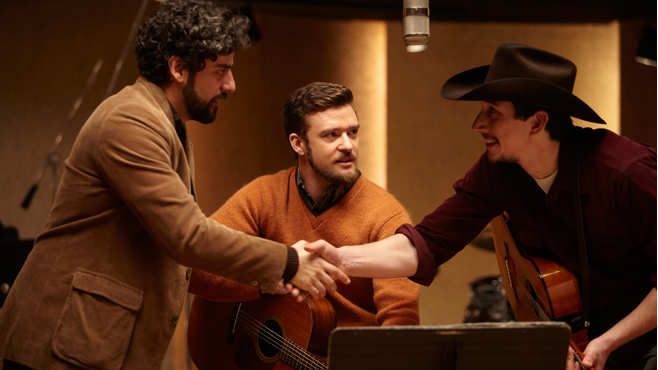 |
| Courtesy of StudioCanal |
What can you say about a Coen Brothers film, other than what you expect is what you're going to get: a damned good film. A misstep for the brothers is rare, and tends to happen when they are trying to be commercial. This isn't that. This is the brothers at their most artistic. This film exists because they wanted to explore a character, and a place, and a time, in that order. And they've executed it magnificently.
Hit the jump for the review, which contains spoilers that want the Cincinnati file.
While the Coens rarely repeat themselves content wise, Davis draws the most comparisons to Barton Fink. Both contain a similar type of story, following a week in the life of a tragic, suffering artist burdened by his own genius and the wider industries (Hollywood in Fink's case, the folk music scene in Davis') inability to recognise it as such. Both are forced to go on absurd, degrading odysseys in an attempt to discover their greater greatness, only for both to end up alone and disillusioned, and loathing both their chosen careers and the people that they have become.
Davis is a character study of the highest order. Everything else is secondary, just as Davis' world revolves entirely around him. Other characters come and go, most barely appearing in more than two scenes. The world passes by Davis (Oscar Isaac) as fast as the New York subway stations flit by the carriage, the people merely passengers on what he believes is his road to greatness. He himself is a vagrant, constantly in transit, relying on the kindness of friends and occasional strangers, who Davis can't help but alienate. His nature is to askew the simple act of "existing," as he puts it, and achieve something more. From Davis' perspective, its the rest of the world that is stopping him, that are conspired from giving him a break.
He admits that he's an asshole, and admits that he hates folk music, and that it's less a passion than a method of expressing his genius. But the fact that his life is the worst kind of terrible is never his fault. It never once occurs to him that it's his bad decisions that have gotten him in his position. Davis isn't a comedy of errors, it's a comedy of disasters. Every thing that can go wrong does for Davis, whose defeatist attitude really isn't that unreasonable considering that every time he turns around, something else blows up in his face. Jean (Carey Mulligan) has it right when she says that everything he touches turns to shit. It just seems to go that way, and because he is who he is, rather than fix things, Davis only ever makes things worse. Even running away from his problems only leads to new ones.
As is common in a Coen Brothers film, the characters that inhabit this world are as vibrant and fully realised as they are brief. Justin Timberlake, John Goodman, Adam Driver, F. Murray Abraham, Garrett Hedlund and Ethan Phillips all put in scene stealing performances. The Coens have that rare ability to strip a character down to their most interesting parts immediately. There is no need for establishment, because what the entire character is about is immediately clear (my favourite character of the film was the massive dinner party guest who enjoyed "early music"). Their role and purpose is less clear, and like in life, occasionally there is no purpose other than to be briefly interesting.
The Coens are, as usual, in fine form, and showcase the best of their abilities here. I'm a big fan of patience in films, and the Coens are masters of it. The camera lingers longer than most. Scenes are filled with silence. Shots are played out in full. And the music, all of which is wonderful, is live and complete. There are no montages, no cut aways. No choruses than next scene. Nearly every song is sung in full, and if not there is a reason why the performance is cut short. Because the songs are characters too, not just atmosphere. They are as much a force in Davis' life, for good or ill, than his friends and family. They are haunting and promising and damning and like Davis wants to be himself, eternal while also fleeting.
And the brilliant, cyclical narrative structure, which I clued in on about the time Davis returns home from Chicago, is yet another of the Coen's structures that highlight that sometimes a person is only capable of dooming themselves to a personal hell. And that the best they can hope for is to realise where they are, and that they are stuck. Barton Fink realized this. Llewyn Davis does not, and that makes him perhaps one of the most tragic of the Coen's characters. He doesn't die, he doesn't rise, and he can't escape his own cycle of torment. He's forced to linger, oblivious. If the movie weren't so damned funny, you'd need to read some Cormac McCarthy afterwards to cheer yourself up.